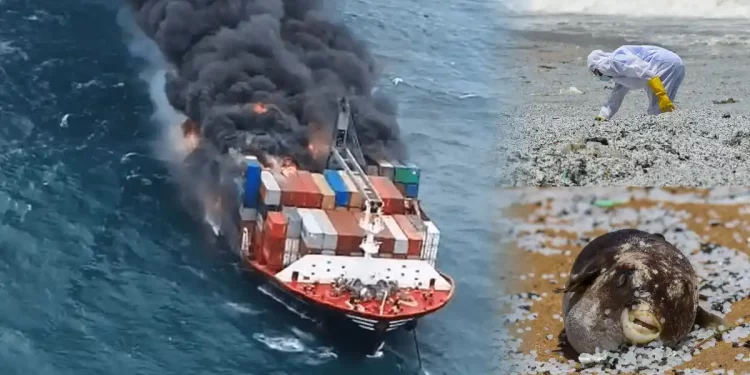Since the X-Press Pearl container ship disaster in May 2021, several nurdles have been washing up the Sri Lankan coastline. Identified by the United Nation as Sri Lanka’s worst maritime calamity, the biggest impact of the X-Press Pearl disaster was not facilitated by the 350 tonnes of heavy oil fuel. Nor was it the perilous chemicals on board, which included caustic soda, methanol, and nitric acid. The most crucial peril arrived from the spilling of 87 containers full of plastic bits – nurdles.
These nurdles are predicted to moor across the Indian Ocean coasts from Malaysia and Indonesia to Somalia. In some regions, the nurdle moors are estimated to be up to 2 metres deep. Several dead bodies of dolphins and the mouths of fish have been discovered. Around 1,680 tonnes of nurdles were unconstrained into the Indian ocean. This disaster is dubbed as the biggest plastic spill in the history of Maritimes disasters, according to a United Nations report.
Sri Lanka’s Nurdles Disaster
Nurdles in the colloquial terminology for pre-production plastic bits, and are known as the raw material for all plastic products. The minuscule beads can be fabricated out of polypropylene, polyvinyl chloride, polyethene, polystyrene, and other plastics. When liberated into the environment from plastic factories or when shipped around the globe as raw material to plastic plans, these nurdles tend to float or sink – depending on their density and depending on whether they are subjected to saltwater or freshwater.
Nurdles are often confused for food by fish, seabirds, and other wildlife. In the environment, they splinter into nano-particles whose perils are more complex. They are the second-largest source of oceanic micro-pollutants by weight, after tire dust, according to the United Nations. An astonishing 230,000 tonnes of nurdles end up in oceans annually.
Similar to crude oil, nurdles are highly tenacious pollutants and constantly circulate in ocean currents and wash ashore for several years. They are also the toxic sponges that entice chemical toxins and other contaminants onto their exteriors.
Nurdles also support the survival of harmful bacteria such as E. coli or even cholera, one study found, traversing them from sewage channels and agrarian runoffs to bathing waters and shellfish beds. This phenomenon is constantly surging.
However, nurdles, unlike commodities like diesel, petrol, and kerosene, are not considered hazardous under the International Maritime Organization’s (IMO’s) hazardous goods code for innocuous handling and storage. This is despite the threat to the environment from plastic bits for almost 30 years, as indicated in a 1993 report from the US government’s Environmental Protection Agency on how the plastics sector could diminish leakage.
At present, environmentalists are collaborating with the Sri Lankan government to transform the X-Press Pearl mishap into a reagent for change.
When the IMO’s marine environment commission met in London, Sri Lanka’s plea for nurdles to be identified as hazardous goods enticed public support with over 50,000 people authenticating a petition.
Such mishaps are preventable, campaigners stated. According to Hemantha Withanage, Director of the Centre for Environmental Justice in Sri Lanka, the X-Press Pearl mishap and spill of chemical toxins and plastic bits into the oceans of Sri Lanka have resulted in ineffable damage to marine life and destroyed the local fishermen’s livelihoods. Withanage stated that the consumption of fish was the principal source of protein for 40% of the Sri Lankans. Owing to the mishap, this consumption estimate has diminished dramatically, he said.
Categorizing nurdles as perilous – as is the circumstance for flammable liquids, explosives, and other environmentally harmful commodities – would make them directed to strict conditions for shipping. Tanya Cox, a marine plastic specialist at the conservation charity Flora & Fauna International, stated that it was essential that nurdles must be stored below deck, in a more full-bodied packaging, with distinct labelling. They would also be subject to calamity-retaliation protocols that can, if executed in the occasion of an emergency, avert the worst ecological influences.
The IMO secretariat will denote the issue to its pollution, prevention, and response committee, which meets in 2022. Environmental crusaders stated that it was unacceptable that the Sri Lankan proposal was not effectively discussed.
In the meantime, the clean-up in Sri Lanka continues. Some of the 46 dolphins, 470 turtles, and 8 whales washing ashore have been etched with nurdles in their bodies, stated Withanage. Approximately 20,000 families have had to stop fishing owing to the calamity.

















